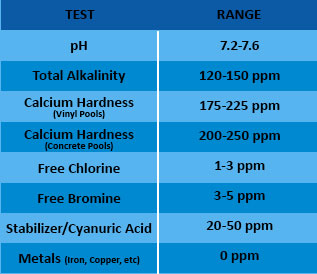
 YOU ASKED
YOU ASKED What’s considered balancing my pool and why is it important?
[open]
What’s considered balancing my pool and why is it important?
[open]

 What levels should I be trying to maintain?
[open]
What levels should I be trying to maintain?
[open]


 How frequently should I test my pool?
[open]
How frequently should I test my pool?
[open]

 How do I test my pool water?
[open]
How do I test my pool water?
[open]

 TESTING
TESTING
 What to Test For
[open]
What to Test For
[open]

 Test Strips
[open]
Test Strips
[open]

 Liquid Test Kits
[open]
Liquid Test Kits
[open]

 Digital Testers
[open]
Digital Testers
[open]

 WE RECOMMEND TESTING KITS & SUPPLIES
WE RECOMMEND TESTING KITS & SUPPLIES